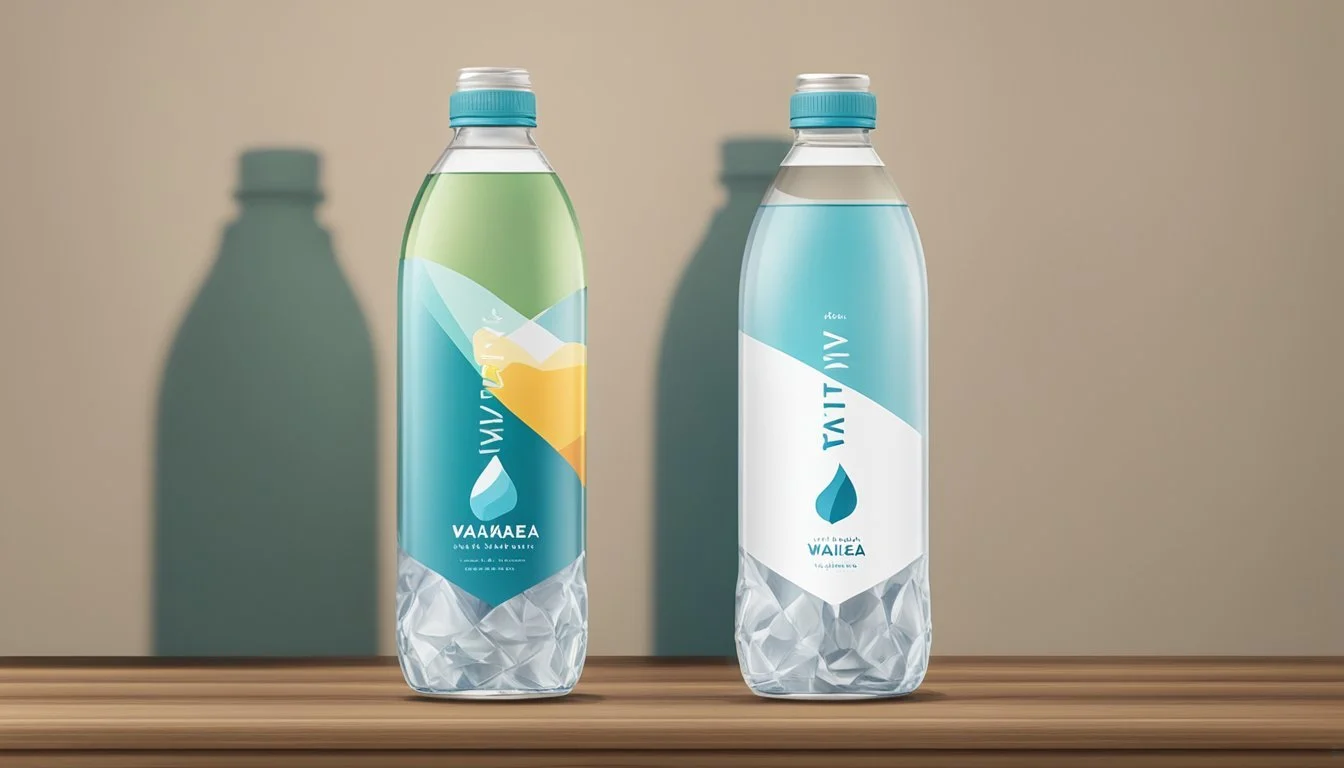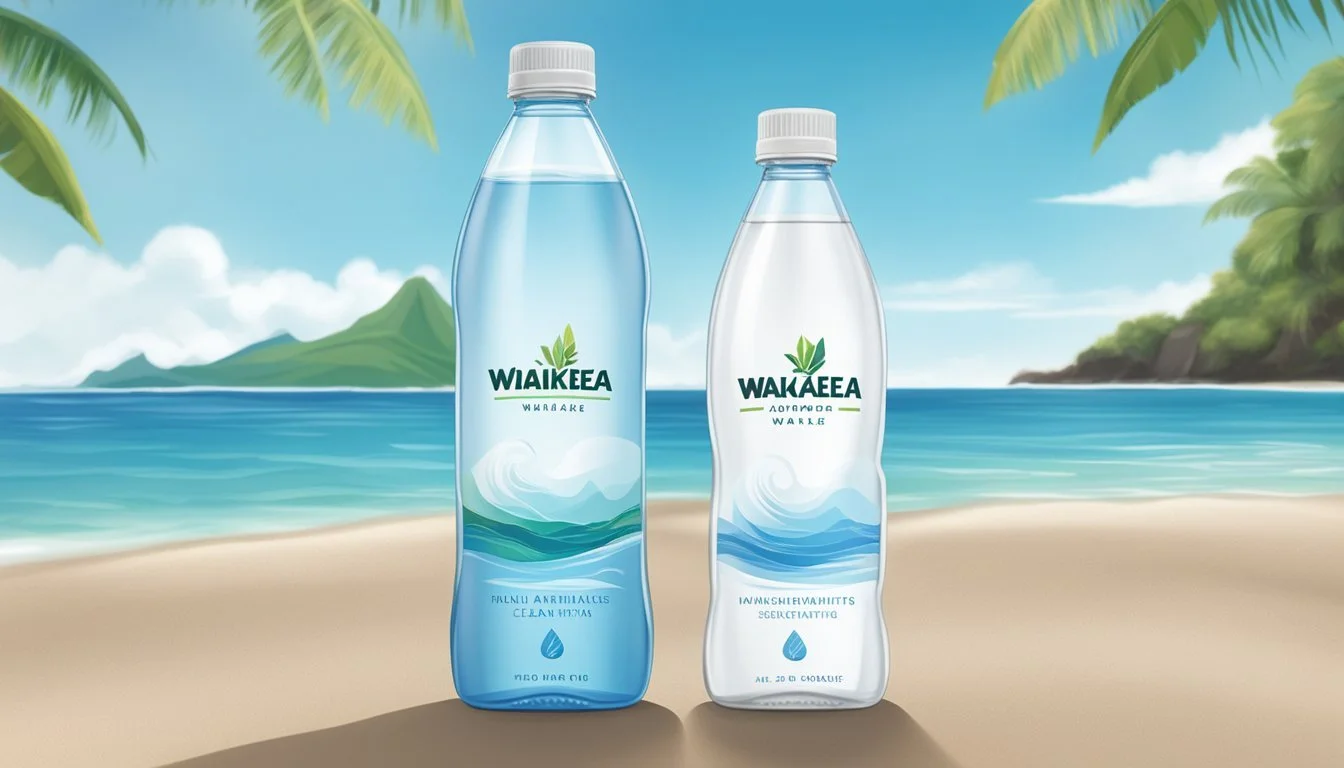Ethos vs. Waiakea
Comparing Top Bottled Waters for Quality and Taste
Choosing between Ethos and Waiakea bottled water can be a challenge for those looking to prioritize quality, sustainability, and taste. Waiakea stands out with its distinction of being the first US bottled water to be certified Carbon Neutral and donating over 5% of its revenue to nonprofits, which highlights its strong commitment to the planet and community. On the other hand, Ethos emphasizes its socially conscious approach by contributing to clean water initiatives, adding value beyond just hydration.
Ethos promotes sustainable packaging, although Waiakea also takes pride in its eco-friendly practices, using recyclable bottles and focusing on reducing its carbon footprint. Taste and quality are key factors, with Waiakea offering naturally alkaline water filtered through volcanic rock, imparting a unique, refreshing flavor profile. Ethos, while also emphasizing quality, doesn't match Waiakea's distinctive sourcing and mineral content.
For consumers prioritizing both environmental impact and social responsibility, Waiakea may have a slight edge thanks to its broader charitable contributions and carbon neutrality. While taste preferences are subjective, the choice ultimately hinges on individual values and the importance placed on corporate responsibility and sustainability efforts.
Understanding Bottled Water
Bottled water has become a significant part of beverage consumption in the United States, presenting various health, environmental, and economic considerations. It comes in several categories and has different impacts on health and the environment.
The Bottled Water Industry in the United States
The bottled water industry in the United States is substantial, driven by increasing consumer demand. In recent years, bottled water has surpassed soft drinks as the most consumed beverage in the country. This shift reflects growing health awareness and a preference for calorie-free alternatives.
Major companies dominate the market, generating billions in revenue. Brands like Ethos and Waiakea contribute to the industry's landscape, emphasizing different values such as sustainability and community impact. Overall, the industry is heavily regulated to ensure safety and quality.
Categories of Bottled Water
Bottled water is categorized into several types, each with distinct characteristics.
Spring water and artesian water come directly from natural sources, often marketed for their purity. Mineral water contains specific amounts of dissolved minerals that can offer health benefits. Purified water, which includes distilled and deionized water, is treated to remove impurities.
Some brands, like Waiakea, promote their naturally alkaline properties, while others, like Ethos, focus on specialized filtration processes. Understanding these categories can help consumers make informed choices.
Health Considerations of Bottled Water
Health benefits and concerns are central to bottled water consumption. Naturally alkaline water, such as that offered by Waiakea, helps neutralize body acidity. This can support various bodily functions. Additionally, mineral water provides essential minerals like calcium and magnesium.
Purified water eliminates contaminants but may lack naturally occurring minerals. Some bottled waters are BPA-free, addressing concerns about plastic leachates. Overall, bottled water is generally considered safe, often marketed as a convenient source of clean drinking water.
Environmental Impact of Bottled Water
The environmental impact of bottled water is a pressing issue. The production and disposal of plastic bottles contribute to plastic waste and environmental degradation. Efforts to mitigate this include using recyclable materials and promoting reusable options.
Brands like Ethos and Waiakea emphasize sustainability. Ethos, for instance, connects purchases to clean water initiatives, while Waiakea uses eco-friendly packaging. The carbon footprint of bottled water also concerns environmental advocates, pushing the industry towards more sustainable practices.
By addressing these issues, the industry aims to balance consumer demand with environmental responsibility.
Water Source and Quality
Ethos and Waiakea, two prominent bottled water brands, differ significantly in their sources and quality. Understanding these differences is key to choosing the better option for hydration and health.
Natural Spring Water Versus Other Sources
Ethos sources its water from natural springs, known for their consistent purity and mineral content. These springs are typically fed by natural rainfall and aquifers, which help filter out contaminants.
Waiakea, on the other hand, gathers its water from the Mauna Loa volcano in Hawaii. This source benefits from filtration through volcanic rock, which enhances its mineral content and alkalinity.
Both sources provide unique benefits, but their quality and characteristics differ due to the nature of their origins.
Purity and Contaminants in Bottled Water
Purity is a primary concern for bottled water consumers. Ethos water undergoes rigorous purification processes to ensure it is free of lead and other harmful contaminants.
Waiakea also emphasizes purity, with a natural filtration process that removes impurities as water travels through volcanic rock. This filtration results in water that is free from common contaminants found in tap water.
Both brands strive for high purity, but their methods and natural filtration processes contribute to this goal differently.
Comparing Mineral Content and pH Levels
Mineral content and pH levels greatly influence the health benefits of bottled water. Ethos water contains essential minerals like calcium and magnesium, crucial for hydration and overall health.
Waiakea stands out with its naturally alkaline pH of 8.8, which helps neutralize body acidity. Additionally, it is rich in minerals and electrolytes, including sodium and potassium.
Ethos offers balanced mineral content, whereas Waiakea provides a higher alkalinity and unique mineral makeup owing to its volcanic source.
The Importance of Purification Processes
Effective purification is vital for ensuring safe and clean drinking water. Ethos uses advanced purification methods, including filtration and ozonation, to eliminate bacteria and other contaminants.
Waiakea relies heavily on its natural filtration through volcanic rock, but also incorporates additional purification steps to enhance water safety.
Both brands prioritize extensive purification processes, though they utilize different techniques based on their unique sources.
These key points highlight the distinguishing factors between Ethos and Waiakea, helping consumers make an informed decision when selecting their preferred bottled water.
Brands in Focus: Ethos Water and Waiakea Water
Ethos Water and Waiakea Water are both renowned for their unique approaches to sustainability and social responsibility, but they also stand out in terms of water quality and packaging innovations.
Ethos Water: Brand Overview and Mission
Ethos Water is known for its dual mission of providing high-quality bottled water and supporting clean water initiatives worldwide. A portion of the profits from Ethos Water sales goes towards funding water programs for children in underdeveloped regions.
Ethos Water uses recyclable PET bottles and has positioned itself as a brand with a cause, aiming to make a meaningful impact on global water scarcity.
Waiakea Water: Brand Philosophy and Social Responsibility
Waiakea Water emphasizes environmental stewardship and social responsibility. Sourced from the Mauna Loa volcano in Hawaii, Waiakea Water is rich in minerals such as silica, calcium, and magnesium.
Waiakea is notable for being the first U.S. bottled water to be certified Carbon Neutral. The company donates a significant portion of its revenue to nonprofits and implements sustainable practices like using eco-friendly packaging.
Analyzing Ethos and Waiakea Water Quality and Sources
Ethos Water and Waiakea Water are sourced from distinct regions, which affect their mineral compositions and taste profiles. Ethos Water, while ensuring safety and purity, does not highlight specific mineral content.
Waiakea Water, sourced from volcanic springs, features naturally occurring minerals like magnesium and silica, contributing to a fresh, crisp taste. This makes a considerable difference for consumers seeking mineral-rich hydration.
Packaging and Environmental Initiatives
Ethos Water and Waiakea Water both prioritize sustainable packaging solutions. Ethos uses recyclable PET bottles and integrates charitable contributions into its business model. Waiakea, on the other hand, uses bottles made from 100% recycled plastic and has a stringent carbon-neutral footprint.
Waiakea's packaging also includes eco-friendly tips and practices, reinforcing its commitment to environmental sustainability. This distinction in packaging and environmental responsibility sets these brands apart in a market flooded with options like Pure Life, Dasani, and Aquafina.
Comparative Analysis of Taste and Physical Properties
A detailed comparison of Ethos and Waiakea bottled water requires examining their taste profiles, pH balance, and electrolyte content. Key attributes such as freshness, mineral composition, and hydration potential offer insight into how each brand performs.
Taste Profile: Blind Taste Tests and Expert Opinions
Ethos Water is noted for its clean, straightforward taste. Experts describe it as refreshing and ideal for everyday hydration. It lacks a significant aftertaste, which some consumers find appealing.
Waiakea, sourced from Hawaiian volcanoes, has a smoother, more mineral-rich flavor. Blind taste tests reveal a subtle but distinct difference due to its volcanic filtration. Expert reviews highlight its light, crisp quality, often associated with its mineral content, including silica.
Understanding Alkalinity and pH Balance in Bottled Water
Ethos Water typically has a neutral pH level, close to 7. This neutrality ensures it suits most people's taste and health preferences without drastically altering the body's natural pH balance.
Waiakea features a naturally alkaline pH level of around 8.2. This alkalinity results from its volcanic filtration process, which infuses the water with minerals. Alkaline water is often sought after for its potential health benefits, including neutralizing acid in the bloodstream and boosting energy levels.
Assessing Electrolyte Levels for Hydration
Ethos Water does not prominently feature added electrolytes, focusing instead on providing a pure and straightforward water option. This simplicity can appeal to those preferring minimal additives.
Waiakea distinguishes itself with its rich electrolyte profile. It contains magnesium, calcium, and potassium, boosting hydration and supporting muscle function. These electrolytes, combined with the water's natural minerals, make it a robust choice for those needing enhanced hydration, particularly athletes.
In comparing to a well-known brand like Essentia, which is infused and ionized to achieve higher electrolyte levels, Waiakea offers a more natural approach to electrolyte content, maintaining a balance between purity and mineral richness.
Health and Hydration Benefits
This section compares the health and hydration benefits of Ethos and Waiakea bottled waters. It will focus on the impact of high mineral content, differences in hydration efficiency, and the potential health implications of long-term consumption.
The Impact of High Mineral Content on Health
Waiakea water contains a rich supply of minerals, including silica, potassium, magnesium, and calcium. Silica supports bone and skin health by helping in collagen synthesis. Potassium and magnesium aid in muscle function and energy metabolism, essential for maintaining overall health.
Ethos water, sourced from natural springs, also contains beneficial minerals. It is high in electrolytes which aid in maintaining the body's electrolyte balance. This balance is crucial for muscle function and hydration.
Differences in Hydration Efficiency
Waiakea water's alkaline pH of 8.2 can promote better hydration and help balance body pH levels. Its volcanic filtration process infuses the water with electrolytes, potentially improving hydration efficiency. Alkaline water is often considered better for hydration due to its higher pH level which can help neutralize acidity in the body.
Ethos water, while not specifically alkaline, provides solid hydration benefits through its natural spring source rich in fresh minerals. It effectively quenches thirst and replenishes electrolytes lost during physical activity. Both brands offer reliable hydration, but Waiakea’s alkaline nature may offer a slight edge in enhancing hydration levels.
Potential Health Implications of Long-Term Consumption
Consuming Waiakea water long-term may contribute positively to bone health due to its silica content. Enhanced hydration and pH balance can also support metabolic health and energy levels. However, it is essential to consider the body's individual needs and consult with health professionals for tailored advice.
Ethos water, consumed over a long-term period, can help maintain a balanced electrolyte level, essential for preventing dehydration. The natural mineral content provides consistent health benefits without posing significant health risks. Both waters are generally considered healthy for everyday consumption.
Economic and Convenience Factors
Ethos and Waiakea bottled water have significant impacts on cost and convenience, which influence consumer choices and community benefits. Both brands offer unique advantages that can affect purchasing decisions.
Comparing Costs Between Bottled and Tap Water
Bottled water, including Ethos and Waiakea, typically costs more than tap water. In the United States, tap water costs pennies per gallon, whereas bottled water can range from $1 to $5 per bottle.
Economic factors also include the cost of shipping purified water, especially for brands like Waiakea, which is sourced from Hawaii. This shipping cost can increase the retail price. Consumers need to weigh these costs against their budget and preferences.
Convenience and Accessibility of Bottled Water
Bottled water offers portability and convenience, making it accessible in various settings such as gyms, offices, and during travel. Both Ethos and Waiakea are widely available in retail stores and online.
Ethos water's added convenience comes from its focus on easily accessible packaging. Waiakea offers a marketing edge with its eco-friendly bottle manufacturing, appealing to environmentally-conscious consumers.
Impact of Water Choice on Consumers and Communities
Choosing bottled water brands like Ethos can indirectly support global communities through their philanthropic contributions. Ethos highlights its efforts in funding clean water projects in underdeveloped regions.
Waiakea donates over 5% of its revenue to nonprofits and supports carbon-neutral production, benefiting both communities and the environment. Community benefits include improved social well-being and environmental sustainability.
Both brands offer more than just hydration, incorporating social and ecological responsibilities into their business models, thus influencing consumer decisions beyond just the product itself.
Regulations and Safety Standards
When choosing between Ethos and Waiakea bottled waters, it is crucial to consider how each brand complies with regulations and safety standards. This section examines the guidelines set by regulatory bodies, the monitoring processes, and the importance of certifications in building consumer trust.
FDA vs. EPA: Understanding the Guidelines
Bottled water regulations in the United States fall under the jurisdiction of the Food and Drug Administration (FDA), while the Environmental Protection Agency (EPA) oversees tap water.
The FDA mandates that bottled water meets standards for lead, chlorine, and other contaminants similar to or stricter than those for tap water. Brands such as Fiji, Evian, and Poland Spring must adhere to these regulations.
The EPA, however, regularly updates guidelines for public water supplies, including acceptable levels of heavy metals and PFAS chemicals.
Monitoring and Ensuring Bottled Water Safety
Monitoring bottled water safety involves rigorous testing procedures. Both Ethos and Waiakea, alongside brands like Mountain Spring Water and Arrowhead, must regularly test for contaminants such as PFAS, lead, and chlorine.
Ethos uses a distillation process and ultraviolet exposure to ensure purity. Waiakea, known for its groundwater source, employs advanced micro-filters and uses virgin plastic bottles to minimize contamination risks.
Compliance with these safety measures is critical for maintaining high-quality standards.
The Role of Certifications and Consumer Trust
Certifications play a pivotal role in consumer trust. Waiakea holds a Title 21 certification, indicating compliance with strict FDA standards. Similarly, suppliers like BlüTriton, which includes brands under the Nestlé portfolio, often showcase multiple industry certifications.
These credentials assure consumers that the water is free from harmful contaminants. The impact of certifications extends to brands owned by major corporations like Coca-Cola and PepsiCo, who need to maintain transparency to solidify their market positions.
Trust is further enhanced when brands are certified as Carbon Neutral, like Waiakea, which also donates a portion of its revenue to environmental causes.
Understanding these key aspects of regulations and safety helps consumers make informed choices between Ethos and Waiakea bottled waters.
Sustainability and Future Trends
Sustainability in bottled water revolves around eco-friendly bottling, sustainable sourcing, and future consumption trends. Understanding these facets can help consumers make informed choices.
Innovations in Eco-Friendly Bottling
Bottled water companies are increasingly adopting eco-friendly bottling practices. For instance, Waiakea uses high-grade 100% rPET (post-consumer recycled PET), reducing energy use by 85% and carbon emissions by 79%. This approach helps minimize plastic waste and its environmental impact.
Ethos is also making strides. They emphasize using recycled materials and have explored biodegradable alternatives. Such initiatives are vital for reducing the environmental footprint associated with plastic bottles. By innovating in packaging, these brands aim to offer sustainable choices to consumers.
The Shift Towards Sustainable Sourcing
Sourcing water sustainably is crucial to preserving natural resources. Waiakea sources from a volcanic aquifer with a 1.4 billion gallon recharge rate, offering a renewable solution. Their bottling facility operates on 33% renewable energy, illustrating a commitment to minimizing environmental impact while providing natural spring water.
Ethos focuses on sourcing from protected spring sources, ensuring minimal ecological disruption. Through partnerships with local communities, they aim to support water conservation efforts. These strategies help maintain a careful balance between meeting consumer demand and preserving natural habitats.
Predicting the Future of Bottled Water Consumption
Future trends in bottled water consumption will likely see a continued push for sustainability. Consumers are becoming more environmentally conscious, seeking products that align with their values. Brands like Waiakea, certified Carbon Neutral, and generous in nonprofit contributions, will lead the charge.
The industry's shift towards renewable energy and sustainable sourcing highlights a growing trend. Innovations like reusable glass bottles and biodegradable materials will also play a role in shaping the market. The focus on reducing plastic waste and supporting the planet reflects a broader societal shift towards environmental responsibility.
These developments suggest that the bottled water market will evolve, with sustainability becoming a central theme.
More About Ethos
Ethos vs Mountain Valley Spring Water: Which Bottled Water is Better?
Ethos vs Richard's Rainwater: Which Bottled Water is Better?
Ethos vs Whole Foods Italian Still Mineral water: Which Bottled Water is Better?
More About Waiakea
Icelandic Glacial vs Waiakea: Which Bottled Water is Better?
Mountain Valley Spring Water vs Waiakea: Which Bottled Water is Better?
Waiakea vs Kirkland Signature: Which Bottled Water is Better?
Waiakea vs Richard's Rainwater: Which Bottled Water is Better?
Waiakea vs Whole Foods Italian Still Mineral water: Which Bottled Water is Better?








